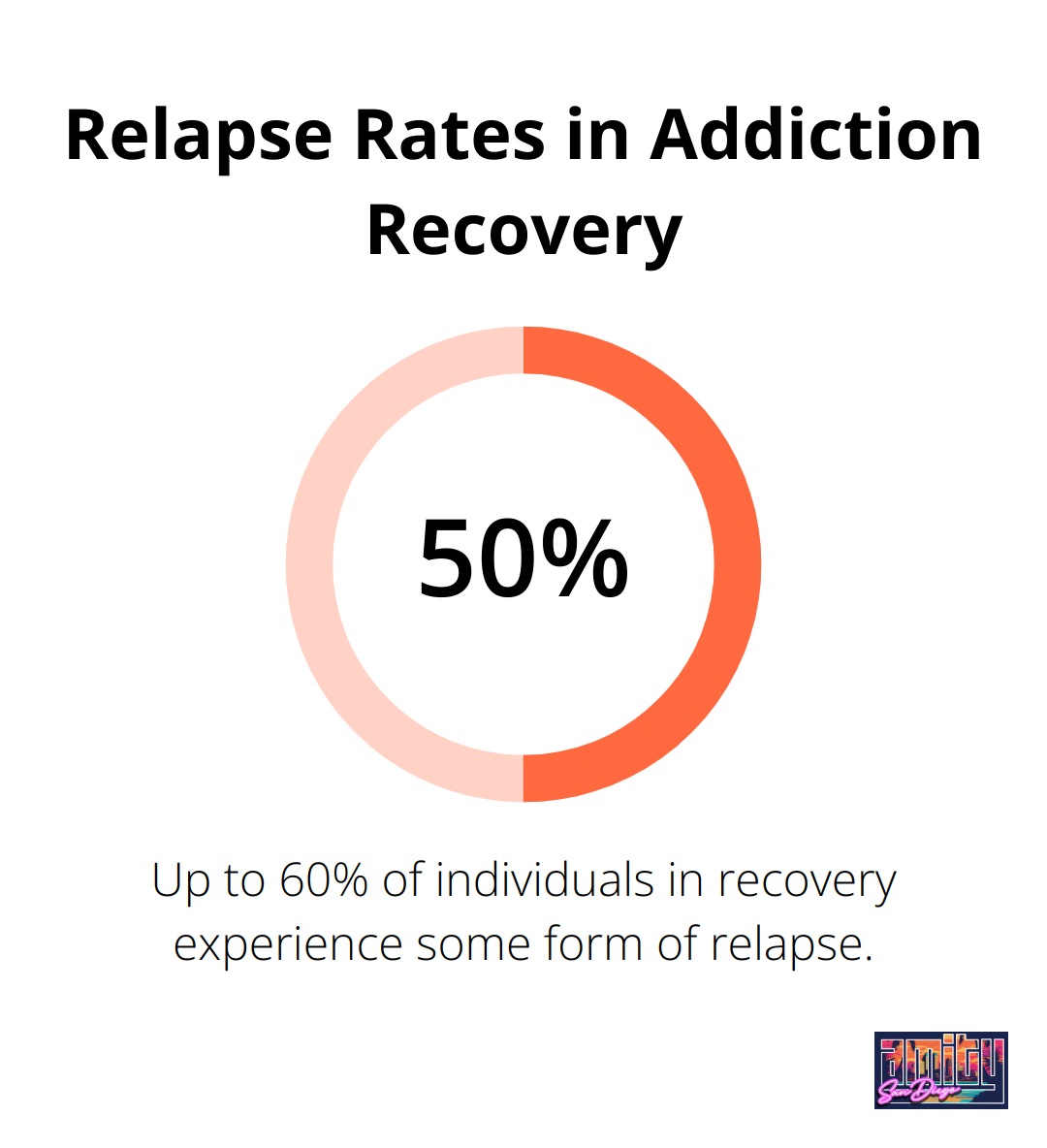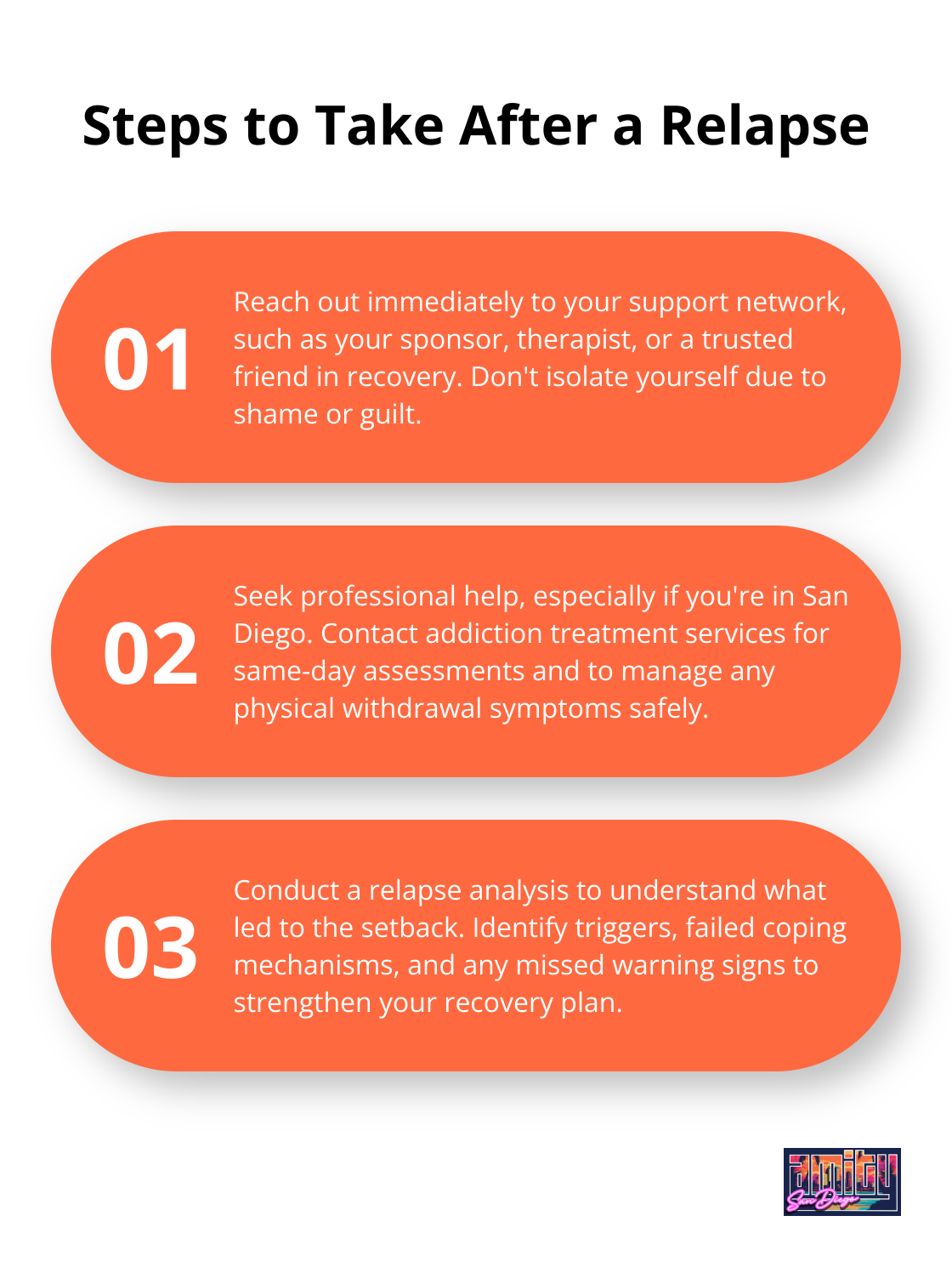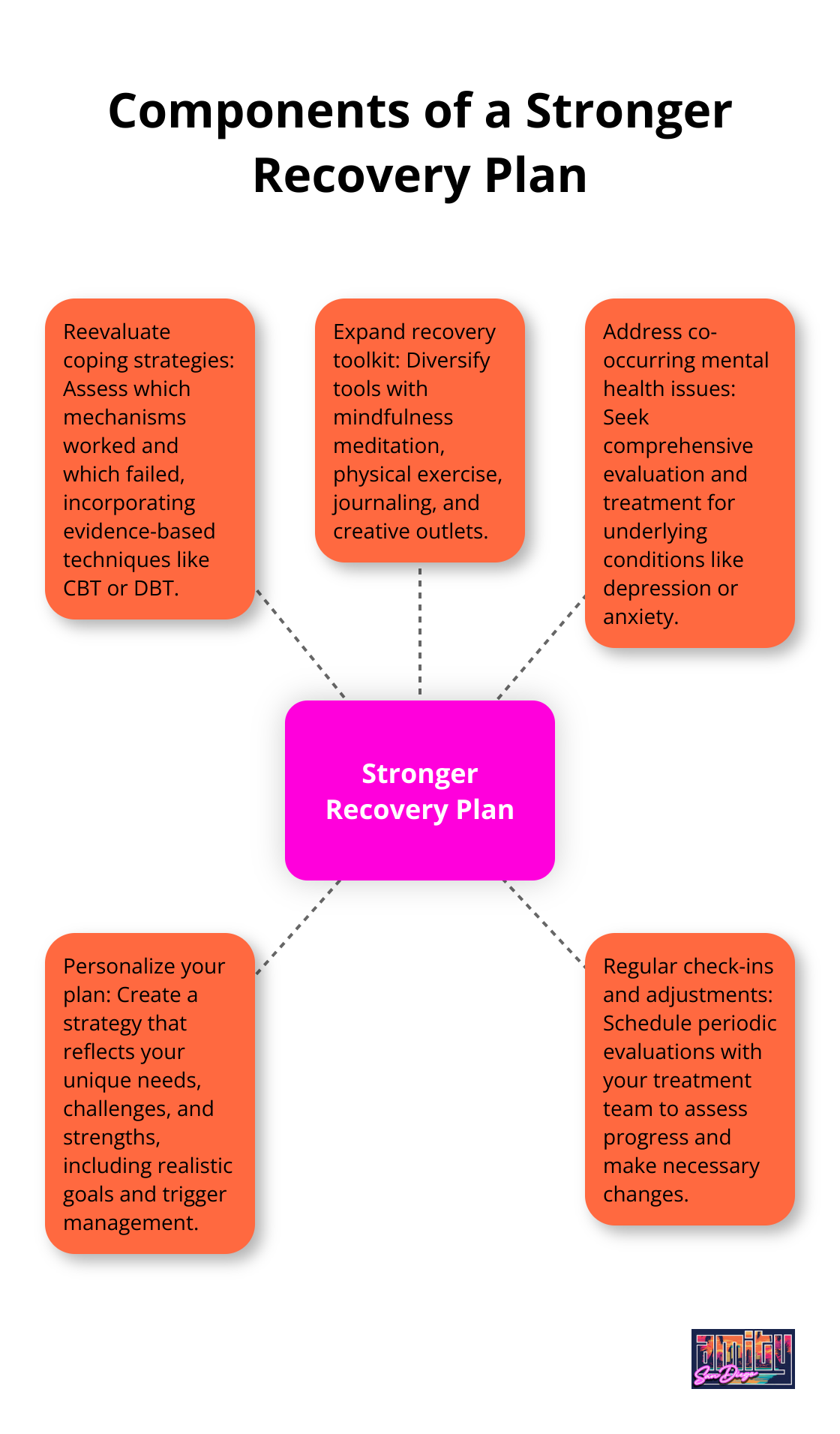Relapse can be a challenging part of the recovery journey, but it doesn’t have to be the end of the road. At Amity San Diego, we understand the importance of effective relapse support after a setback.
In this post, we’ll explore practical strategies to help you bounce back and strengthen your recovery plan. Whether you’re seeking guidance for yourself or a loved one, we’re here to provide valuable insights and resources for navigating this crucial phase of the healing process.
What Is Relapse in Addiction Recovery?
Understanding the Relapse Process
Relapse in addiction recovery unfolds as a complex process, not a single event. At Amity San Diego, we consider relapse a potential part of the recovery journey, not a failure. The National Institute on Drug Abuse reports that 40-60% of individuals in recovery experience some form of relapse.

Identifying Early Warning Signs
Early detection of warning signs plays a vital role in preventing full-blown relapse. Common signs include:
- Heightened stress and anxiety levels
- Withdrawal from support networks
- Neglect of self-care routines
- Idealization of past substance use
- Avoidance of therapy or support group meetings
Vigilance and honesty with oneself allow for early intervention when these signs appear.
Common Triggers and Management Strategies
Triggers vary among individuals, but some frequent ones include:
- Work or relationship stress
- Financial pressures
- Exposure to people or places associated with past use
- Negative emotions (e.g., anger, loneliness, boredom)
We work with clients at Amity San Diego to develop personalized strategies for managing these triggers. These strategies might involve stress-reduction techniques, building a robust support network, or acquiring new coping skills.
Transforming Setbacks into Learning Opportunities
A relapse, if it occurs, should serve as a learning opportunity rather than a mark of failure. Analysis of the factors leading to relapse proves essential:
- Did you overlook any warning signs?
- Did you encounter unexpected triggers?
- Did your coping strategies prove ineffective?
This information strengthens your recovery plan. Many individuals find that a relapse (once processed) actually reinforces their commitment to sobriety.
Recovery represents a journey, not a destination. The next crucial step involves taking immediate action after a relapse occurs. This action ensures you regain your footing and continue on your path to long-term recovery.
For those seeking addiction treatment San Diego, there are various options available to support your recovery journey.
What to Do Right After a Relapse
Reach Out Immediately
The first step after a relapse is to contact your support network. This could be your sponsor, therapist, or a trusted friend in recovery. Clinical observations have shown high rates of relapse in treatment-seeking individuals within weeks and months of entering and completing treatment.
Don’t isolate yourself. Shame and guilt are common feelings after a relapse, but they can hinder your progress. Your support system exists to help, not judge.

Seek Professional Help
If you’re in San Diego, contact addiction treatment San Diego immediately. Professional intervention can help you manage any physical withdrawal symptoms safely and provide essential emotional support.
At Amity San Diego, we offer same-day assessments and can quickly adjust your treatment plan if needed. Our team is available 24/7 to ensure you get the help you need when you need it most.
Conduct a Relapse Analysis
Once you stabilize, it’s important to analyze what led to the relapse. This isn’t about self-blame, but about understanding and learning. Ask yourself:
- What were the triggers?
- What coping mechanisms failed?
- Did you miss any warning signs?
Write down your answers. This exercise isn’t just therapeutic; it’s a practical tool for strengthening your recovery plan. Studies have shown relapse rates as high as 65% to 70% in the 90-day period following treatment.
Reassess Your Environment
Take a close look at your surroundings. Are there elements in your environment that contributed to your relapse? This could include:
- Toxic relationships
- High-stress work situations
- Easy access to substances
Try to identify areas where you can make positive changes. This might involve setting new boundaries, changing your living situation, or even considering a career shift.
Rebuild Your Support System
A relapse can sometimes strain relationships within your support network. It’s important to:
- Be honest about what happened
- Take responsibility for your actions
- Communicate your renewed commitment to recovery
Consider expanding your support system. This might include joining new support groups, finding a different sponsor, or connecting with peers who have successfully navigated relapse.
A relapse doesn’t erase your progress. It’s a setback, yes, but also an opportunity to build a stronger foundation for your ongoing recovery. The key is to act quickly, seek help, and learn from the experience. As we move forward, let’s explore how to rebuild and strengthen your recovery plan to prevent future relapses.
How to Rebuild a Stronger Recovery Plan
Reevaluate Your Coping Strategies
After a relapse, you must assess which coping mechanisms worked and which failed. The Substance Abuse and Mental Health Services Administration (SAMHSA) provides guidance and resources to community leaders, educators, health professionals, and first responders for effective recovery strategies. We recommend incorporating evidence-based techniques like Cognitive Behavioral Therapy (CBT) or Dialectical Behavior Therapy (DBT) into your plan. These approaches help rewire thought patterns and behaviors associated with substance use.

Expand Your Recovery Toolkit
You should diversify your recovery tools. The National Institute on Drug Abuse emphasizes a comprehensive approach. This might include:
- Mindfulness meditation: It can reduce cravings and stress.
- Physical exercise: Regular workouts boost mood and reduce relapse risk.
- Journaling: It helps track triggers, emotions, and progress.
- Creative outlets: Art or music therapy can provide healthy emotional expression.
You should try new methods. What works for one person may not work for another, so remain open to experimentation.
Address Co-occurring Mental Health Issues
Mental health and addiction often intertwine. Research shows that about half of individuals who experience a substance use disorder during their lives will also experience a co-occurring mental health condition. You should seek a comprehensive evaluation for co-occurring disorders (if you haven’t already). Treating underlying mental health issues like depression or anxiety often proves key to maintaining sobriety.
The FDA has approved several medications for alcohol and opioid use disorders that, when combined with counseling, can significantly improve outcomes.
Personalize Your Recovery Plan
At Amity San Diego, we focus on creating a robust, personalized strategy to prevent future setbacks. Your recovery plan should reflect your unique needs, challenges, and strengths. This might involve:
- Setting realistic, achievable goals (both short-term and long-term)
- Identifying specific triggers and developing strategies to manage them
- Creating a daily routine that supports your recovery
- Establishing a support network (including professionals, peers, and loved ones)
Regular Check-ins and Adjustments
Your recovery plan isn’t static. It requires regular evaluation and adjustment. Schedule periodic check-ins with your treatment team to assess your progress and make necessary changes. This proactive approach helps you stay ahead of potential challenges and reinforces your commitment to recovery.
Develop an Aftercare Plan
Developing a long-term recovery plan may include support groups and ongoing therapy after formal addiction treatment San Diego. Aftercare helps maintain the progress you’ve made and provides continued support as you navigate life in recovery.
Final Thoughts
Relapse doesn’t end your recovery journey; it offers a chance for growth and renewed commitment. At Amity San Diego, we’ve witnessed many individuals bounce back stronger after a setback. Recovery is a process, and setbacks can occur, but your response and forward movement matter most.
Self-compassion plays a vital role in recovery. Treat yourself with the same kindness you’d offer a friend facing similar challenges. Avoid harsh self-judgment, as it can hinder your progress. Instead, focus on the steps you take to get back on track.
For those who seek ongoing relapse support, Amity San Diego offers comprehensive outpatient programs tailored to your unique needs. Our team provides evidence-based therapies, holistic approaches, and personalized care to support your recovery goals. Your journey to lasting recovery is possible, and we’re here to support you every step of the way.



